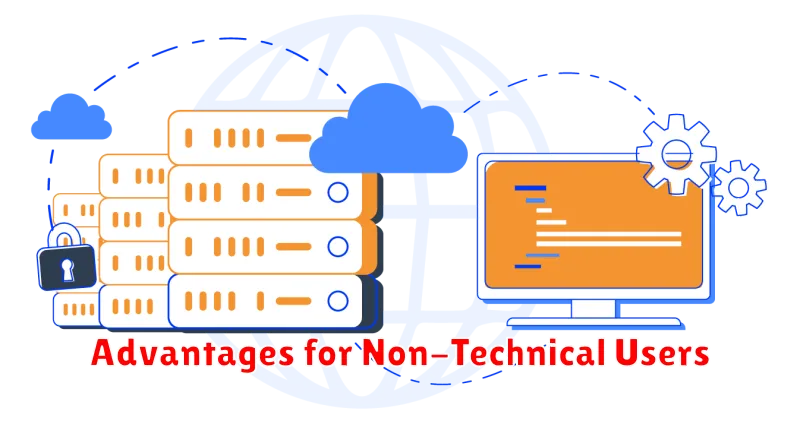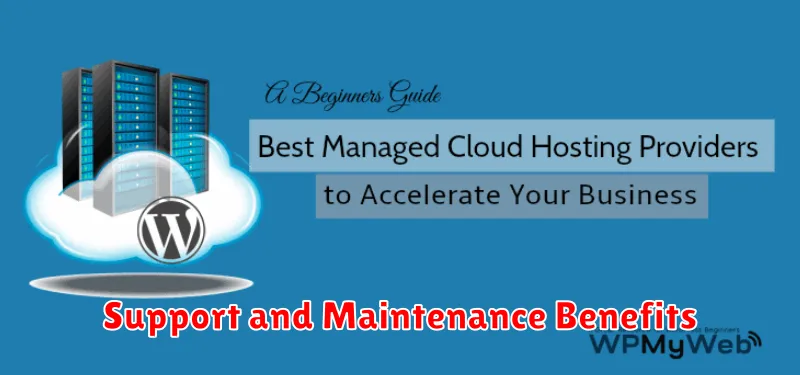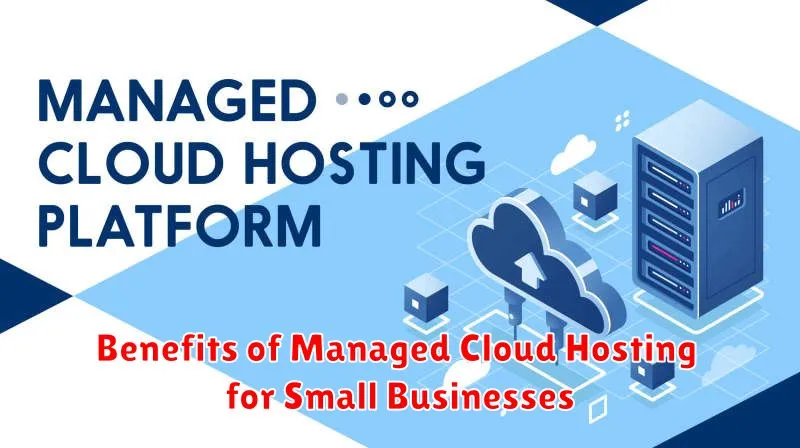In today’s competitive digital landscape, small businesses face mounting pressure to optimize operations, enhance security, and scale efficiently. Managed cloud hosting offers a compelling solution, delivering a comprehensive suite of services that address these crucial needs. This article delves into the significant advantages of managed cloud hosting for small businesses, exploring how it can streamline processes, bolster security postures, and unlock new avenues for growth. By leveraging the power of managed cloud solutions, small businesses can gain a competitive edge, improve IT efficiency, and focus on core business objectives.
Moving to the cloud can be a transformative step for any small business. However, managing the complexities of cloud infrastructure can be daunting. Managed cloud hosting providers alleviate this burden by taking on the responsibility of managing the underlying infrastructure, including hardware, software, security, and 24/7 support. This allows small businesses to reap the full benefits of cloud computing without the need for dedicated in-house IT expertise. From enhanced scalability and cost-effectiveness to robust security and improved uptime, managed cloud hosting presents a powerful solution for small businesses seeking a competitive advantage in the digital marketplace.
What Is Managed Cloud Hosting?
Managed cloud hosting is a service where a third-party provider manages the cloud infrastructure and the technical aspects of your hosting environment. This means the provider takes responsibility for tasks like server maintenance, security, software updates, and performance optimization.
Instead of owning and managing your physical servers or virtual machines, you leverage the provider’s expertise and resources. This allows you to focus on your core business operations, rather than the complexities of server management.
Key aspects of managed cloud hosting often include:
- Infrastructure Management: The provider handles server setup, maintenance, and security.
- Software Updates: Keeping the operating system and other necessary software patched and up-to-date.
- Security Monitoring & Response: Protecting your data and infrastructure from threats.
- Performance Optimization: Ensuring your applications run efficiently.
- Technical Support: Providing assistance with technical issues.
Essentially, managed cloud hosting offers a more hands-off approach to website and application hosting, providing businesses with scalability, reliability, and enhanced security without the burden of in-house management.
How It Differs from Unmanaged Services
With unmanaged cloud hosting, you are responsible for the entire server environment. This includes tasks like server setup, operating system updates, security patching, software installation, and performance monitoring. Think of it like owning a house – you are responsible for all the maintenance and repairs.
Managed cloud hosting, on the other hand, shifts these responsibilities to the provider. The provider handles the backend infrastructure, allowing you to focus solely on your applications and business operations. Imagine renting an apartment – the landlord takes care of building maintenance, freeing you from those tasks.
The key difference lies in the level of control and responsibility. Unmanaged services offer maximum control but demand significant technical expertise. Managed services offer less direct control over the server infrastructure but provide convenience and simplicity, especially beneficial for small businesses lacking dedicated IT staff.
| Feature | Managed Hosting | Unmanaged Hosting |
|---|---|---|
| Server Management | Provider | Client |
| OS Updates | Provider | Client |
| Security | Provider (Mostly) | Client |
| Application Management | Client | Client |
| Control Level | Limited | Full |
Advantages for Non-Technical Users

Managed cloud hosting offers significant advantages for small businesses lacking dedicated IT staff. One of the most compelling benefits is its ease of use. The hosting provider handles all the technical complexities, including server maintenance, security updates, and software installations. This allows non-technical users to focus on their core business operations rather than wrestling with server configurations.
Simplified control panels provide intuitive interfaces for managing websites, email accounts, and databases without requiring specialized technical knowledge. These user-friendly dashboards often include features like one-click installations for popular applications and straightforward website management tools. This empowers business owners to maintain their online presence with minimal technical expertise.
Furthermore, managed cloud hosting typically includes 24/7 support. This means expert assistance is readily available to address any technical issues that may arise. Non-technical users can rely on the provider’s support team to troubleshoot problems, ensuring their website remains online and accessible.
Top Providers for Small Businesses
Choosing the right managed cloud hosting provider is crucial for small businesses. Several factors should influence this decision, including pricing, scalability, customer support, and security features. Three leading providers consistently rank high across these criteria.
Cloudways offers flexible, pay-as-you-go pricing with a user-friendly interface, making it a popular choice for beginners. They provide a variety of cloud infrastructure options, allowing businesses to customize their hosting environment.
SiteGround is known for its excellent customer support and robust security features. While slightly pricier, they offer optimized solutions for various platforms like WordPress and WooCommerce, which can be advantageous for specific business needs.
A2 Hosting distinguishes itself with its speed and performance optimizations. Their Turbo servers offer significantly faster loading times, which is vital for businesses seeking a competitive edge online. They also provide a variety of hosting options, from shared to dedicated, catering to different business sizes and requirements.
Costs and Value Compared
Examining the costs of managed cloud hosting versus traditional hosting reveals key differences. Traditional hosting often involves upfront investments in hardware, software licenses, and IT staff. These costs can be substantial for small businesses. Ongoing maintenance, security updates, and potential downtime further add to the expense.
Managed cloud hosting, while potentially having a higher monthly fee than basic shared hosting, often proves more cost-effective in the long run. The elimination of capital expenditures, reduced IT staffing needs, and minimized downtime contribute to significant savings. Furthermore, the scalability of cloud hosting allows businesses to adjust resources as needed, avoiding overspending on unused capacity.
The value proposition of managed cloud hosting extends beyond cost savings. Enhanced security, improved performance, and increased reliability are intrinsic benefits. These factors contribute to a more robust online presence and a better customer experience, ultimately driving business growth.
Support and Maintenance Benefits

A primary advantage of managed cloud hosting is the comprehensive support and maintenance provided by the hosting provider. This frees up your internal team to focus on core business objectives rather than server management. 24/7 monitoring ensures potential issues are identified and addressed proactively, minimizing downtime and disruptions. Regular security updates and patching are handled by the provider, safeguarding your data and applications against evolving threats. This reduces your internal IT burden and associated costs.
Managed services typically include automated backups and disaster recovery solutions. This provides peace of mind knowing your data is protected and can be easily restored in case of unforeseen events. Technical support is readily available to assist with any server-related issues, offering expertise and guidance when needed. This proactive approach to maintenance and support contributes to a more stable and secure hosting environment, allowing small businesses to operate more efficiently.
Scalability for Business Growth
Managed cloud hosting offers unparalleled scalability, a critical factor for growing businesses. As your business expands, so too will its online presence and resource demands. With traditional hosting, scaling can be a complex and time-consuming process, often requiring significant hardware investments and downtime.
Cloud hosting, however, allows you to easily adjust your resources as needed. Need more bandwidth to handle a sudden surge in traffic? Simply scale up your plan with a few clicks. Experiencing a temporary lull? Scale down to avoid unnecessary costs. This on-demand scalability ensures you only pay for what you use, optimizing your IT budget and allowing you to adapt quickly to changing market conditions.
This flexibility is especially beneficial for small businesses experiencing rapid growth or seasonal fluctuations. The ability to quickly scale resources up or down provides the agility needed to capitalize on opportunities and navigate challenges effectively. This empowers businesses to stay competitive and maintain optimal performance even during peak periods.

